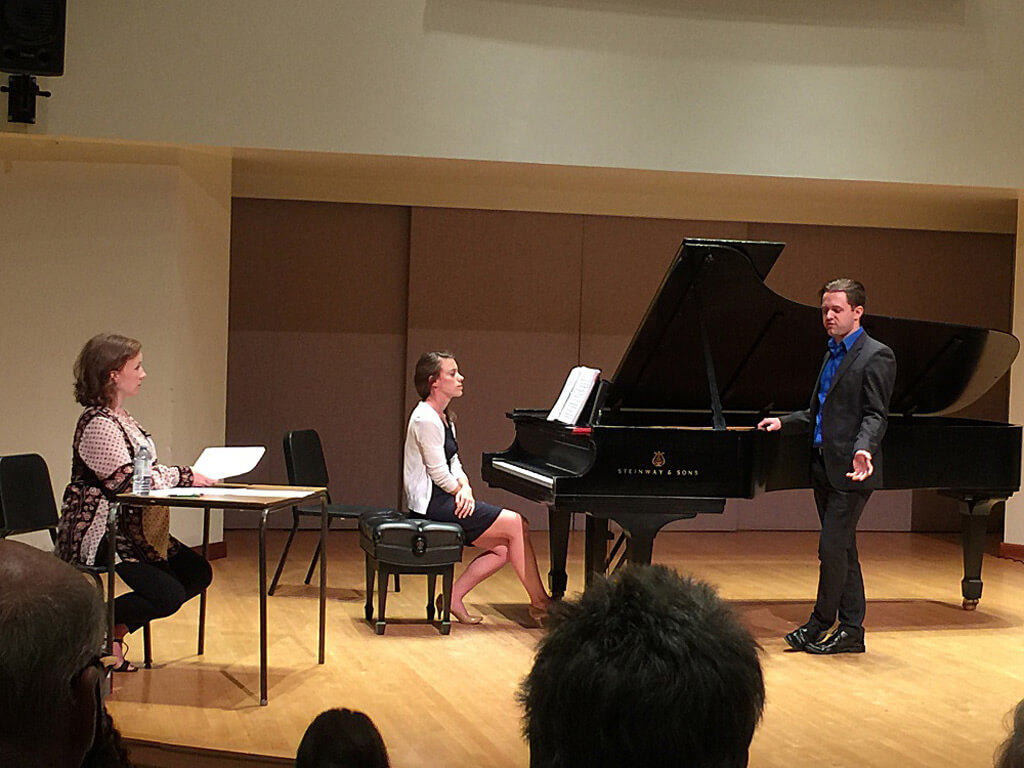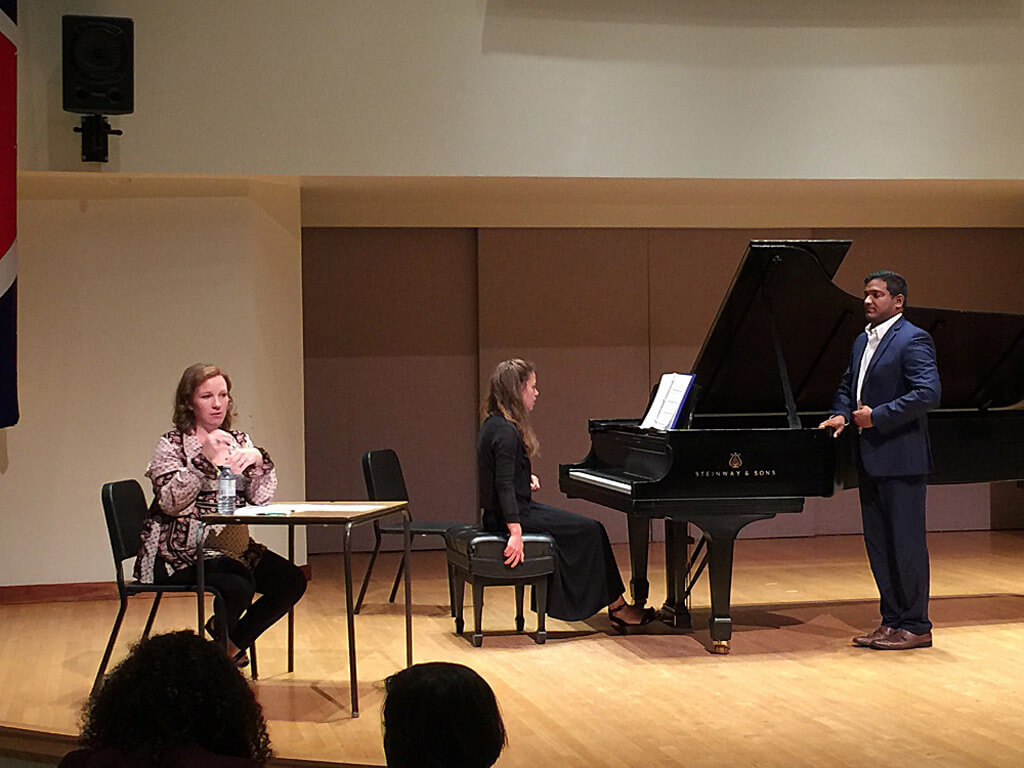
Toronto Summer Music Festival. Public Masterclass at Walter Hall. July 19th.
I admit it. I was heartbroken when German soprano Anne Schwanewilms cancelled her appearance this week as a mentor in the Toronto Summer Music Art of the Song program. One of my favourite singers, I had just gone to Munich to hear her Elsa in Lohengrin and was looking forward to her appearance in Toronto. But singers are human, and they get sick like the rest of us. In her place is American mezzo-soprano Sasha Cooke. I can’t say I’m all that familiar with her voice, having only heard her once, as Mrs Oppenheimer in Doctor Atomic at the Met a few years ago. Her very informative website shows a wealth of experience in opera and concert appearances, with a wide-ranging repertoire from Mahler to Jerome Kern, and a significant emphasis on contemporary repertoire. Her website also mentions quite a lot of experience in teaching and mentoring.
Six singers and four pianists participated in her masterclass this afternoon — soprano Ellen McAteer, mezzos Rose Naggar-Tremblay and Simone McIntosh, tenors Marcel d’Entremont and Asitha Tennekoon, and baritone Jeremy Hirsch. The four pianists were Stéphane Mayer, Helen Becqué, Rachael Kerr, and Madeleine Christie. As is the normal practice of a class, each singer sings a piece all the way through, followed by the teacher working with the student on specific sections of the song. It could be anything from technique, vocal production, language, diction, to aspects of interpretation. Often the session concludes with another complete run through. Each student has more or less 30 minutes of her time. Impressively, the three-hour class went by very quickly, without even a washroom break.
Last week’s mentor, Craig Rutenberg, is a pianist/coach. Given his background, it was only natural that he paid special attention to the pianists while staying away completely from vocal technique for the singers, opting for interpretation, language, and textual issues. Cooke was quite different this afternoon. She spoke little to the pianists except to compliment them on their playing — yes, they did play beautifully. She commented extensively on issues of vocal production and sometimes on technical issues such as on breathing etc. It was a very illuminating session. She was quite specific in her comments, and she asked each singer probing questions about the text, to make sure the singers really understand what they are singing about.
First up was American baritone Jeremy Hirsch and pianist Stéphane Mayer, in Schubert’s “Das Abendrot.” A difficult song with an unusual two-octave range, it taxes the singer when it comes to making sure the intonation is even from top to bottom. A high baritone, Hirsch has a very nice instrument with a naturally produced sound and an easy top. The extreme low notes in this song are more of a challenge for him. Incidentally, someone said this years ago — can’t remember who — something to the effect that “the voice is like a short blanket, you cover the top, and the feet get cold; but if you make sure the bottom (feet) is taken care of, you’ll end up with a short top.” I’ve always found that humorous! In a longer than usual session, Cooke spent time with Hirsch to modify his approach to the lowest notes, and it helped noticeably right away, easing some of the strain. She also emphasized the need to really express the singer’s inner feelings on the face. Interestingly, Cooke also demonstrated in the low register, and I was amazed at her big and robust sound.
Mezzo Rose Naggar-Tremblay followed, with Helen Becqué at the piano, singing Brahms’ “Immer leiser wird mein Schlummer.” To my ears, Brahms writes perfectly for the low female voice, and this is one of those lovely songs. Naggar-Tremblay sang with gorgeous, rich timbre, just the right sound for Brahms. Cooke explored with the singer the deeper meanings of the text, on the themes of death and lost love, here intertwined. She helped the mezzo to bring greater expression into the words — all in all, a fine session.

Next up was tenor Marcel d’Entremont, who was also a participant last summer in Soile Isokoski’s class. His development has been extremely impressive. The voice is warm with a sweet and engaging timbre. It has also become more technically assured the past year, particularly in his approach to the top register. The song was “Die Lorelei” by Liszt, really the height of Romanticism, and quite demanding technically. He was able to sing the last note dolcissimo — either a G or A-flat — and he sang it flawlessly at least four or five times. The middle part of the song is very dramatic, almost operatic, and he met the challenges well. Cooke delved into the story with him, to help him better understand the enigmatic character of Lorelei. I must also mention that Rachael Kerr played the difficult piano part brilliantly.

Tenor Aistha Tennekoon, who also participated in Rutenberg’s class, sang Duparc’s “Chanson triste” with Helen Becqué. His is a naturally bright tenor with a rich, smooth sound which can also be slightly nasal in timbre. He sang the piece with lovely tone and technical security. Cooke worked with him extensively on his French diction, and to help him introduce more expression and more variation in tone colours into his singing.
Mezzo Simone McIntosh, who was impressive in Alban Berg’s “Nacht” from Sieben fruhe Lieder last week, chose Poulenc’s “Sanglots.” Hers is a naturally big, beautiful, gleaming high mezzo, especially at the top. Like some of the other pieces, the text of “Sanglots” is not easily accessible. Cooke helped the mezzo to explore the emotional depths of the piece, suggesting that the singer uses moments in her own life to tap into the feelings necessary to communicate to the listener. McIntosh said she had in the past imagined a “bad breakup” as a means to access the necessary emotions. In an inspired stroke, Cooke asked baritone Hirsch to sit onstage opposite the singer, as a sort of catalyst. And you know what? It worked! McIntosh sang it with greater feeling and involvement. You may say this is a gimmick, but as I see it, any “trick” that can achieve the desired result is worthwhile.
The final participant was lyric soprano Ellen McAteer, who also participated last week. Hers is a lovely lyric soprano of good volume and sheen. Her piece was “Villes” from Britten’s Les Illuminations. This is a text-rich piece, with a fast tempo and quicksilver changes, to depict the chaotic life in a big city. Somehow it always reminds me of a Paris street scene, not unlike Gershwin’s An American In Paris, just no honking of horns. Perhaps a bit one-dimensional as a stand-alone piece if taken out of the cycle of nine songs. Cooke asked the soprano to experiment with different approaches, in her delivery, in the tempi, etc.. McAteer sang it well, brimming with energy.
Periodically throughout the class, Cooke offered her pearls of wisdom, her philosophy of being a singer. I find her ideas very sound. First of all, a singer needs to maintain a sense of gratitude — to the art, to the people around her, to her teacher, colleagues, and the audience. In other words, be humble. Often singers are too wrapped up in themselves, in their own world of music making, to take much notice of others. A second, very important point she made, is to be open to new ideas, to be willing to experiment, to be challenged, and not just retreating to safety and the familiar. Challenge yourself, in other words. Her third point is to be always prepared. Music-making — in opera, orchestral concerts, and even in solo recitals — is teamwork. A singer must do his or her homework, show up prepared, having learned everything there’s to learn about his or her part. The rehearsal process is for putting it altogether with other members of the creative team, and for a singer to learn the music of the other people in the cast – not sure she said that, but she’ll probably agree! In any case, I was very impressed with Ms Cooke as a teacher, and I think the young artists benefited from her wisdom a great deal. I look forward to the two re-Generation concerts later this week.
#LUDWIGVAN
Want more updates on Toronto-centric classical music news and review before anyone else finds out? Get our exclusive newsletter here and follow us on Facebook for all the latest.



